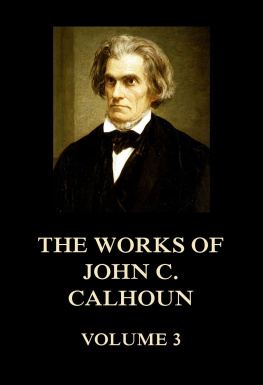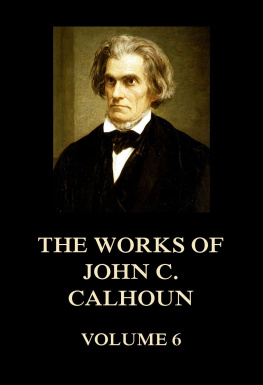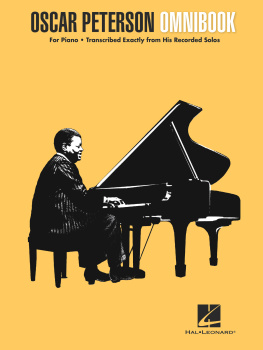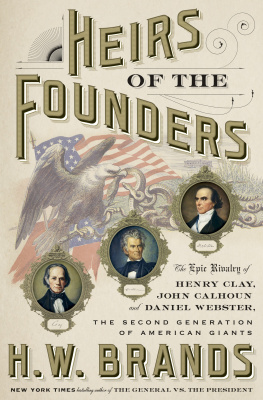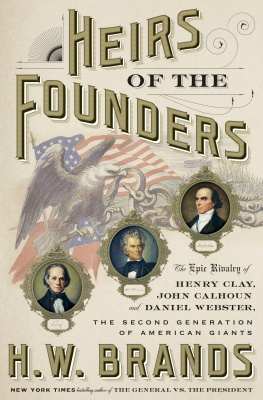Merrill D. Peterson - The Great Triumvirate: Webster, Clay, and Calhoun
Here you can read online Merrill D. Peterson - The Great Triumvirate: Webster, Clay, and Calhoun full text of the book (entire story) in english for free. Download pdf and epub, get meaning, cover and reviews about this ebook. year: 1987, publisher: Oxford University Press, genre: Detective and thriller. Description of the work, (preface) as well as reviews are available. Best literature library LitArk.com created for fans of good reading and offers a wide selection of genres:
Romance novel
Science fiction
Adventure
Detective
Science
History
Home and family
Prose
Art
Politics
Computer
Non-fiction
Religion
Business
Children
Humor
Choose a favorite category and find really read worthwhile books. Enjoy immersion in the world of imagination, feel the emotions of the characters or learn something new for yourself, make an fascinating discovery.

- Book:The Great Triumvirate: Webster, Clay, and Calhoun
- Author:
- Publisher:Oxford University Press
- Genre:
- Year:1987
- Rating:3 / 5
- Favourites:Add to favourites
- Your mark:
- 60
- 1
- 2
- 3
- 4
- 5
The Great Triumvirate: Webster, Clay, and Calhoun: summary, description and annotation
We offer to read an annotation, description, summary or preface (depends on what the author of the book "The Great Triumvirate: Webster, Clay, and Calhoun" wrote himself). If you haven't found the necessary information about the book — write in the comments, we will try to find it.
The Great Triumvirate: Webster, Clay, and Calhoun — read online for free the complete book (whole text) full work
Below is the text of the book, divided by pages. System saving the place of the last page read, allows you to conveniently read the book "The Great Triumvirate: Webster, Clay, and Calhoun" online for free, without having to search again every time where you left off. Put a bookmark, and you can go to the page where you finished reading at any time.
Font size:
Interval:
Bookmark:
THE GREAT TRIUMVIRATE

Webster Replying to Hayne. Painting by G. P. A. Healy. Courtesy of the Boston Art Commission
Webster, Clay, and Calhoun
MERRILL D. PETERSON

Oxford University Press
Oxford New York Toronto
Delhi Bombay Calcutta Madras Karachi
Petaling Jaya Singapore Hong Kong Tokyo
Nairobi Dar es Salaam Cape Town
Melbourne Auckland
and associated companies in
Beirut Berlin Ibadan Nicosia
Copyright 1987 by Oxford University Press, Inc.
Published by Oxford University Press, Inc.,
200 Madison Avenue, New York, New York 10016
Oxford is a registered trademark of Oxford University Press
All rights reserved. No part of this publication may be reproduced,
stored in a retrieval system, or transmitted, in any form or by any means,
electronic, mechanical, photocopying, recording, or otherwise,
without the prior permission of Oxford University Press.
Library of Congress Cataloging-in-Publication Data
Peterson, Merrill D.
The great triumvirate.
Includes index. 1. StatesmenUnited Statesbiography.
2. Webster, Daniel, 17821852. 3. Clay, Henry, 17771852.
4. Calhoun, John C. (John Caldwell), 17821850.
5. United StatesPolitics and government18151861. I. Title.
E339.P47 1987 973.50922 8631254
ISBN 0-19-503877-0
7986
Printed in the United States of America
on acid-free paper
TO
Colleagues, Students, and Staff
OF THE
CORCORAN DEPARTMENT OF HISTORY
UNIVERSITY OF VIRGINIA
19621987
This book has a dual character. On the one hand, it is a collective biography of three American statesmenHenry Clay, Daniel Webster, and John C. Calhounwhose careers were virtually coterminous and who because of their mutual eminence and power became known as The Great Triumvirate. On the other hand, it is a history of public policy and political leadership in the United States during the forty years, roughly 18121852, when these three men held the center of the stage. Coming to this work after many years of research and scholarship focused on Thomas Jefferson, it was perhaps inevitable that I should conceive of it as a study of the second generation of American statesmanship.
I began the book in 1971. For several years other projects took precedence, but by 1976 I was giving The Great Triumvirate major attention and it was well advanced five years later when I accepted a tour of duty as Dean of the Faculty of Arts and Sciences at the University of Virginia. The book was completed in the sabbatical year, 198586, following my retirement from this office. I am well aware that on subjects as large as mine true completeness is seldom attained, and it certainly has not been attained here. In this regard I take comfort from the wisdom of an earlier American historian, Woodrow Wilson, who remarked that were one to pursue the last scrap of evidence and to incorporate the last detail it would take as long to write history as to enact it, and one should have to postpone reading it to the leisure of the next world.
Acknowledgments are owed first to the University of Virginia, including the Alderman Library, for aid and support that have been indispensable to the writing of this book. Scarcely less important have been the fellowship awards of the National Endowment for the Humanities and the National Humanities Center. Residence at the Center in 198081 provided me with nine months of uninterrupted time to write, along with the stimulation of a new environment and interesting colleagues. Grants from the American Philosophical Society and the American Council of Learned Societies have also aided my research. In the course of that research I have visited libraries, historical societies, and other depositories from Concord, New Hampshire, to Baton Rouge, Louisiana, and Madison, Wisconsin; and I am indebted to all of them. I am especially grateful, however, to the editorial offices of the Papers of John C. Calhoun, at the University of South Carolina, and the Papers of Henry Clay, at the University of Kentucky, which extended to me the courtesy of consulting materials collected for these works. (With respect to the Papers of Daniel Webster, at Dartmouth College, this proved unnecessary because of the availability of a prior microfilm edition.) Some parts of Book Four appeared in another form in Olive Branch and SwordThe Compromise of 1833, published by Louisiana State University Press, in 1982, to which I make acknowledgment. I wish also to thank William W. Abbot for reading several of the early chapters; Amy Henderson, James Barber, Frederick Voss, and Ellen Miles at the National Portrait Gallery; Jessica Kitay, William Gilmore, Michael Holt, George Herring, Daniel Hollis and Richard Ellis for small favors; my wife Jean for patience and encouragement; and Sheldon Meyer, who has been my editor and counselor at Oxford University Press for almost thirty years.
In quoting from letters and manuscripts I have taken the liberty of modernizing peculiarities of spelling, punctuation, and capitalization.
Charlottesville, Virginia | M.D.P. |
THE GREAT TRIUMVIRATE
PATHS TO POWER
The Twelfth Congress of the United States, convening on November 4, 1811, was a watershed in the history of the republic. It marked the entry into national politics of a new generation of leaders who had had no part in the founding of the republic and whose highest aspiration was to preserve it. Preservation was not a task for sunshine patriots in 1811. President James Madison, in his opening message to Congress, issued a call to arms. He reported on the failure of the latest round of diplomacy with Great Britain and urged Congress to make the country ready for war. For seven years American peace and commerce had been held hostage to the European belligerents, Britain and France. There were grievances enough to justify war with either or both powers, but in the eyes of the administration and the ruling Jeffersonian Republican party Britain was the chief aggressor against American rights, honor, and independence. On the seas of trade, where she was supreme, Britain continued to treat the United States like colonies. Her cruisers hovered off the Atlantic coast and plundered American carriers in the neutral trade. Ships of His Majestys Navy impressed thousands of American seamen into its service, thereby assaulting the very existence of American nationality and citizenship. The British government demanded that the United States cooperate in its commercial warfare against Napoleons continental system as the price of protection for neutral carriers, cargoes, and profits. War was narrowly averted in 1807 after the Chesapeake Affair, in which a British frigate brutally fired on an American naval vessel, killing three and wounding eighteen. The president, Thomas Jefferson, pressed Britain for a negotiated settlement, to no avail. Six months later he proposed an embargo of American commerce in order to avoid war and also to force justice on Britain by the denial of trade. In the latter aim the experiment failed, and the embargo was repealed when Madison became president, although he stuck to the policy of pursuing some form of commercial coercion as the means of securing American rights and interests without war. Now, after almost three years, the policy had come to a dead end. Pending the outcome of one last diplomatic overture, Madison was ready to go to war.
Next pageFont size:
Interval:
Bookmark:
Similar books «The Great Triumvirate: Webster, Clay, and Calhoun»
Look at similar books to The Great Triumvirate: Webster, Clay, and Calhoun. We have selected literature similar in name and meaning in the hope of providing readers with more options to find new, interesting, not yet read works.
Discussion, reviews of the book The Great Triumvirate: Webster, Clay, and Calhoun and just readers' own opinions. Leave your comments, write what you think about the work, its meaning or the main characters. Specify what exactly you liked and what you didn't like, and why you think so.



